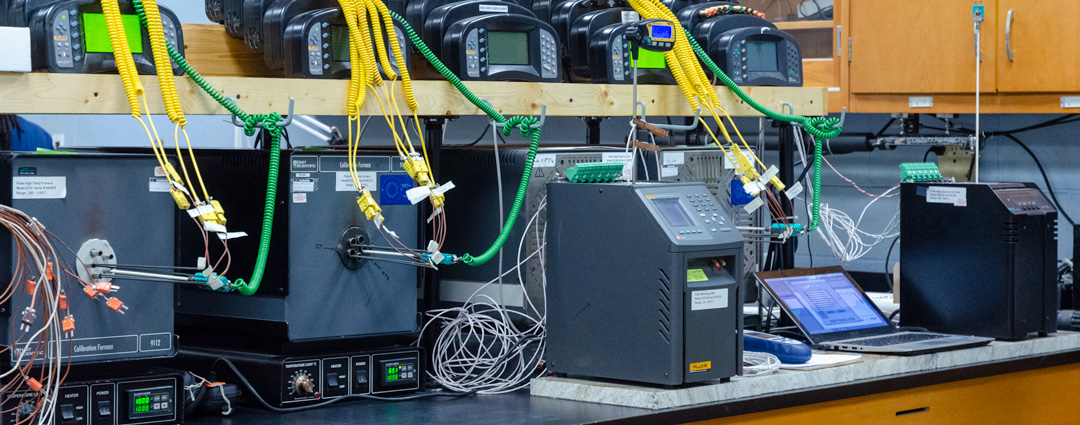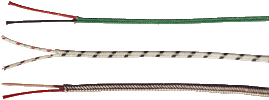- General Industrial
- Aerospace
- Brick & Ceramics
- Chemical & Petrochemical
- Pharmaceutical, Food, Dairy, & Beverage
- Engineering & Architecture (EPC Firms) & Major Equipment OEMs
- Glass
- Incineration
- Metals Manufacturing & Heat Treating
- OEM & Equipment Builders
- Oil & Gas - Downstream & Refining
- Oil & Gas Upstream and Midstream
- Plastics & Fiber / Textiles Industries
- Power
- Pulp & Paper
- Rubber, Cement, & Aggregate
- Semiconductor
- Test & Measurement

Laboratory
Calibrations
Our Metrology laboratory operates under guidelines set forth in
the NIST Handbook 150-2 (Aug 95) and ISO/IEC Guide 25 3rd edition
(1.4.11.2B). It is equipped to calibrate thermocouples and
RTD's
using NIST traceable measuring and test equipment. Our equipment's
useful range is from -40C to 1700C and includes cryogenic points
of -195.64C and -56.42C. We also maintain the triple point of
water.
MIL-STD-45662-A is used as a guide for all calibrations. Other
references and standards used might include (but are not limited
to) ASTM-563, E-77, E-207, E-220, E-230, E-601, IEC 584-1, 751 or
ANSI/MC 96.1, JMS Southeast offers calibration services for
standard thermocouples as well as non-standard thermocouples.
Because of possible inhomogeneities along the length of the
thermocouple, readings may vary from one furnace to the next. It
is not recommended that a calibration be performed on used
thermocouples, but we will calibrate your sensors based on the
initial
thermocouple tolerances. Since sensors do not have trim
pots of microprocessors to adjust, our calibration reports consist
of 'As Found Data'. However, if you would like for us to calibrate
a sensor along with a transmitter, readout device, or controller
which may have adjustable guts, we will be more than happy to
adjust the instrument so that your system accuracy is documented.
Definitions of Common Calibration Terminology
Everyday terms may mean something a little different in the context of a calibration. Provided here for your benefit is the ordinary definition of commonly used terms compared to definitions provided by one commonly referenced standard, ASTM E344.
Uncertainty (Webster): 1. indefinite 2. not certain to occur 3. not known beyond doubt
Uncertainty (ASTM E344): n -- of a temperature measurement, parameter derived from an analysis of a measurement and its result, that characterizes the range in which the true temperature is estimated to lie, generally within a given confidence.
Error (Webster): The difference between an observed or calculated value; not a true value. The amount of deviation from a standard or specification.
Error (ASTM E344): n -- of a temperature measurement, result of a temperature measurement minus a true value of temperature.
Precision (Webster): The degree of refinement with which a
measurement is stated.
Precision (ASTM): n -- the scatter between individual values of test data
within the subset, normally computed with respect to the mean of
the subset.
Bias (Webster): Deviation of the expected value of a
statistical estimate from the quantity it estimates.
Bias (ASTM): n -- the scatter between the mean values of subsets of
data, from each other and from the accepted value.
JMS Southeast - What we refer to as uncertainties fall
under 2 categories:
1. Mathematical / statistical / or calculated uncertainties: Those
interpolated or extrapolated numbers which are impossible to
determine without more frequent measured points. These numbers are
) at the measured points, expandable between points and go out to
infinity beyond the end points.
2. Measurement uncertainties: Those numbers derived at the
measurement points which must be added to the total possible
uncertainty of measurement. They include reference probe,
instrument, probe under test and medium instabilities plus
accuracy ratings of those devices.
Our calibration report is the most comprehensive in the industry,
and we hope that the numbers arrived at do not scare you. We
assure you that we use the most updated and modern equipment
available to take these readings. We maintain natural standards
(triple point and freeze point cells) and all of our equipment is
traceable to tests performed by the NIST. A list of equipment used
is printed on the calibration report, and all appropriate
documentation is maintained in our Metrology Laboratory.
Testing
JMS Southeast, Inc. offers extensive testing of our sensors. The
standards below may be used during testing. If certain standards
are required, please specify.
|
Homogeneity - This is a standard test
performed by JMS to verify thermoelement homogeneity.
ASTM E-207, E-220, E-230 |
Metallographic Examination - This special test
can be performed for alloy identification.
ASTM E-235 |
|
Pressure Test - JMS can perform a special
pressure test to detect or locate leaks by bubble emission
techniques.
ASTM E-515 |
Time Response Test - JMS can measure the
specified response-time characteristic of a sensor.
ASTM E-644 |
|
Helium Leak Test - The Mass Spectrometer
Method can be used to determine sheath integrity.
ASTM E-908, E-839 |
Drift Test - A Drift Test can be performed to
determine the stability of a sensor. An automatic Life Cycle
testing apparatus is available to test your conditions in our
lab.
ASTM E-601, E-644 |
|
Water Test - JMS can perform a special test to
detect leaks.
ASTM E-839 |
Thermal Cycle Test - Thermal Cycling can
simulate operating temperature ranges.
ASTM E-235, E-644 |
|
Radiographic Inspection - This special test
can be performed to determine sheath dimensions and to detect
defects.
ASTM E-94, MIL-STD-453C |
Insulation Resistance Test - This is a
standard test performed at JMS to determine a resistance value
of the insulation.
ASTM E-235, E-644, E-780, E-1137 |
|
Liquid Penetrant Test - This special test can
be performed to detect defects.
ASTM E-235, MIL-STD-6866 |
Re: For a point calibration 2 points are a minimum. For a range calibration 3 points ore more are necessary for proper interpolation of results. See pages 1-2 #15 (5&6) or 3-2 #16 (5&6). |
Quality Inspections
JMS Southeast, Inc. provides laboratory services for the temperature sensors we manufacture. Throughout the manufacturing process, JMS includes quality inspections. The Quality Control Department conducts the final quality control inspection on
100% of all sensors. Standard methods for manufacturing and quality control testing may include procedures in accordance with the following:
| ASTM E-235 | ASTM E-1137 |
| ASTM E-574 | ASTM E-1129 |
| ASTM E-585 | ASTM E-1684 |
| ASTM E-608 | ASTM E-1350 |
| ASTM E-839 | ASTM E-380 |
| IEC 61515 | IEC 60751 |
Our laboratory also may reference the following specifications:
| ASTM E-235 | ASTM E-1137 |
| ASTM E-574 | ASTM E-1129 |
| ASTM E-585 | ASTM E-1684 |
| ASTM E-608 | ASTM E-1350 |
| ASTM E-839 | NIST Monograph 175 |






